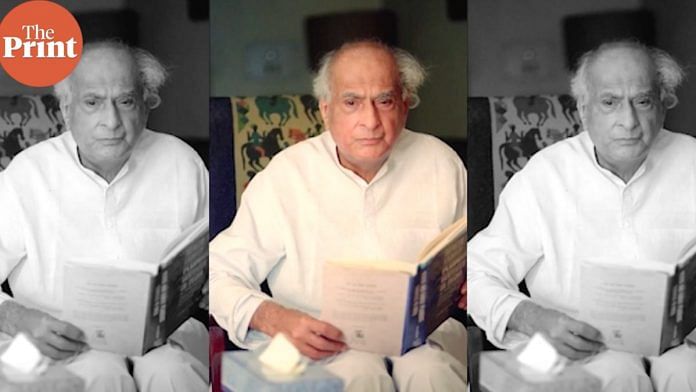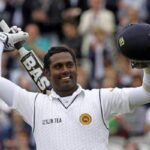Recently I was in West Berlin, to attend a conference organised by the Club of Rome. And one of my friends, a very distinguished professor, Professor [Denis] de Rougemont, read a paper and said that if only we could abolish sovereign nation-states, all the problems of the world would be solved.
I have very high regard for men of academic distinction. There’s only one thing sometimes lacking, that they build ceilings before they lay the foundations. And so he told me, and he told in his paper, that after all, God did not create sovereign states, only man created them. Obviously, although God never took me into confidence, I know that he did not create sovereign states.
But then I asked him, if God did not create sovereign states, nor did God create market economy or a consumer-oriented economy, let’s abolish both. And I also gave him an assurance on behalf of India, and there I exceeded the limits of propriety, that the minute he sends me a telegram that sovereign state of France, Germany, Britain, United States abolished, India, being always motivated by idealistic consideration, will abolish sovereign state of India.
But we know today, that despite all the efforts, institutional or otherwise, which go into the making of what is called United Europe, the real fact is that France still pursues a foreign policy of its own. So does Germany, so does the United States, so does Britain. And, therefore, while we hope that by the turn of the century, this may not be the case, we have to safeguard our sovereignty and our independence, as the only shield we have against anything that might be evil in the international community. And I have not heard yet that the international community is guided by the Sermon on the Mount.
And that is why I took time to emphasise what was obvious, but which is nevertheless relevant in the world of today, that for the poor countries of the world, there is only one shield, namely safeguarding their sovereignty and their independence. And this was not merely a reaction of a backward Indian, it was a uniform reaction of the entire developing world represented at the conference in Berlin. That’s why I did it.
The second point I made was, I have made it for the benefit of those who are fascinated by outer indices of power. And there are many in my country who are fascinated by the outer indices of power, who count guns and missiles. And to them I said that more than guns and missiles, the sanction behind foreign policy is not merely the sovereignty and independence, but the ultimate sanction behind any foreign policy is, above all, the unity and the cohesiveness of a social structure into which that foreign policy is rooted.
And the third point I made was, that if we are not to live from day to day, responding as it were to flow of ebb and flow of events, that if we are not to improvise foreign policy, but if foreign policy is to reflect some fundamental processes of history—and I am assuming that there are fundamental processes of history; the history is not some total of accidents, that over a long period of time there are trends and tendencies, and these trends and tendencies can be understood in terms of interaction between continuity and change—that if this be so, then no foreign policy will be utterly, utterly blind, if it has not an input into it of a deep insight into history [and] historical processes.
Those are the kind of general considerations, which are valid for any foreign policy, which wants a durability longer than a few years, you play your game and come to grief. But for a country like India, these conditions are fundamental. And I came to the conclusion yesterday that a foreign policy will be a hothouse plant, something sustained and supported by mere external crops, if it does not grow out of the roots, the traditions of a country, if it is not nurtured by the soil of that country, if it does not excite the passion of a vast multitude of the country, because I submitted that the days of 18th and 19th century of secret diplomacy are long over.
The intrusion of the common man is a patent factor disturbing the structures and diplomacy and its style in the world of today. And indeed I should like to tell you that so perceptive a protagonist of real politic, as my very distinguished friend Dr Henry Kissinger, long before he became responsible, reflected the dilemma of our time. And I have a quotation from what he said, and I quote, “What is the future of democracy when the propagandist side of policies becomes more and more separated from the substantive side?”
That is the dilemma of our time. That is the dilemma of the outer coverage in which each nation sells its policy in the manner of a smart salesman of Madison Avenue, of which we have our counterparts in India. That this propagandist side of politics becomes more and more separated from the substantive side. When you say that a thing is in dependence of eternal values of truth, beauty and goodness, you suddenly discover that you have found out that the policies are not in defence of truth, beauty and goodness. Such a propagandist side becomes immediately in contradiction with substantive side.
So my friend Dr Henry Kissinger says, “Yes, probably the solution lies in following”, and this is what he says, “the democracies”, he says, “which have been most successful have been those based on essentially aristocratic form.” True, true. That means in 19th century, or even in the early part of this century, if foreign policy could be conducted secretly, if the masses of people did not demand, if newspapers were not so inquisitive, if truth does did not come out, then that is the ideal condition for pursuit of a foreign policy of a kind, but of a kind which contradicts the aspirations of the people. And that is why I said that in the world of today, a diplomat, a foreign minister, or anybody concerned with foreign policy, which seeks to omit the intrusion of the great unwashed, is likely to come to grief. I was not making an academic point, because even if my credentials are suspect, I’m sure you will not suspect the credentials of Dr Henry Kissinger.
And in our country, there’s a greater credibility attaching to imported ideas. I went on, therefore, to argue that insofar as our foreign policy was, in a sense, a brainchild of Jawaharlal Nehru, it was intensely realistic: it was rooted in the traditions of our country, in the history of our country, that evoked response from the wide mass of our people; that it was realistic in the sense that it more nearly reflected the realities of situation emerging out of the Second World War. And what is the reality of the situation? For hundreds of years, the foreign policy was regarded merely as an attempt to create a structure of balance of power.
It was an easy exercise, first of all, because men were not conscious. And they accepted the superiority and wisdom of their rulers. And therefore, they allowed foreign policy to be formulated by aristocrats.
A Talleyrand here, a Metternich there, a Castlereagh there, Count so-and-so there, and so on and so forth. And they carried it out until President Wilson, in his idealism, protested at the end of the First World War that there shall be no secret clauses, that there should be open covenants, openly arrived at. People said… the case-hardened politicians blamed him as an idealist, but he was merely reflecting, in his own perceptive way, the emergence of the new dimension in international affairs.
So I said that the foreign policies were merely exercises in structuring a balance of power. It was easy because, after all, in the 19th century and up to the beginning of the Second World War, it was an easy exercise to structure a balance of power of a few sovereign states: France, Germany (before the First World War), the Austro-Hungarians, the Ottoman Turks (who were deemed to be sovereign), and czarist Russia.
And if one could have a permutation and combination of this, which Winston Churchill lyrically described in the first volume of his war memoirs, saying, “Witness the great tradition of 400 years of British history. We have combined with France against Germany, with Germany against France. We have combined with Spain against France, and France against Spain. And ultimately, we have come out successful.”
That was easy. That was quite easy because, after all, in terms of sheer numbers, the permutations and combinations of four variables are easily determined: four into three into two into one, and so on.
But in the world of today, with 120 or 130-odd independent nations, how do you determine the balance of power? Although we have new concepts of balance of power called mobile balance of power, not fixed balance of power, a quadrilateral balance of power, a quadripartite balance of power between United States, Soviet Union, Western Europe, Japan, and China. But the rub is that, according to the classical doctrine of Baron von Clausewitz, who has been the presiding deity of the military academies of the world, there was only one sanction behind balance of power that ultimately went to war. And this is a very annoying question now.
A balance of power is without sanction. Because we know in the nuclear age, everybody is terrified out of his wits, except Mao Tse-Tung. And Mao Tse-Tung says, what does it matter? If for the great cause, everybody dies, Chinese will survive.
But then the poor Czechs say that they too want to survive. And the ruralitarians say they do want to survive, but they don’t want to die for the greater glory of an ideology. That is the difficulty. That is the difficulty. That balance of power without a capacity to inflict the war, as an instrument for enforcing that balance of power, is by process of reductio ad absurdum, an exercise in futility. And knowing the logical difficulties and practical difficulties, theories are being propounded. Yes, the global war is out of the question. After all, the very first strike will inflict the casualty of 30 million or 40 million. And no sane general staff will order such a war, which invites in the first strike, whoever be the first strike, such enormous losses.
So there are new theories. All right, let’s have limited war. Then there is a refinement of the theory that instead of limited war, and along with limited war, let’s have limited uses of nuclear tactical weapons.
Now, I should like to know a war game, and how it is to be played, and between which parties, where there is a limited war, limited, so that you use tactical atomic weapon. And where is the distinction between tactical atomic weapon and strategic atomic weapon? So we are back to square one. And we have seen the fate of limited wars. The limited war in West Asia is causing acute crisis. A limited war in Korea led to nowhere. A limited war in Vietnam produced no result, except a peace settlement around a table in Paris.
So what is the guarantee that limited war with tactical nuclear weapons will produce any other result? And that is why Mr Nehru, more than anybody else, more than any other statesman of the world, whose eyes were bloodshot by Cold War, saw more clearly and fully the nature of the world which has now emerged, of which the symbol is the nuclear weapon, and all that which goes with it. And after all, it is a trite saying, technology does determine tactics and strategy. So it happened when tank came into being. So it is when nuclear weapons come into being. And it will be very supreme folly if one does not take into account the full implications, the linkages between technology and modern war. And so I come back that the Indian foreign policy, as conceived and conceptualised, was a truer understanding of the world as it emerged.
People thought that Mr Nehru is wide-eyed and an idealistic gentleman. But time and again, if you read carefully what he had to say, he said quite carefully that the world of today does not lend itself to coexistence between confrontation and cooperation. And with passage of time, it is either-or.
And the events, as they unfold themselves, put us teasingly this question, either-or. But our minds and human minds always display a time lag between the reality and its perception. And so we call into being all the arguments and arsenals of the established chanceries of the world, which are fed on the diet of Baron von Clausewitz and all that goes with it, even though times have changed.
Now you might say that this is too lyrical a view of our foreign policy. But even if it is lyrical, I think it has stood by and large the test which you must apply to any foreign policy. Did it or did it not serve our national interest? And while serving our national interest, did it aggravate, accentuate the crisis in the world?








